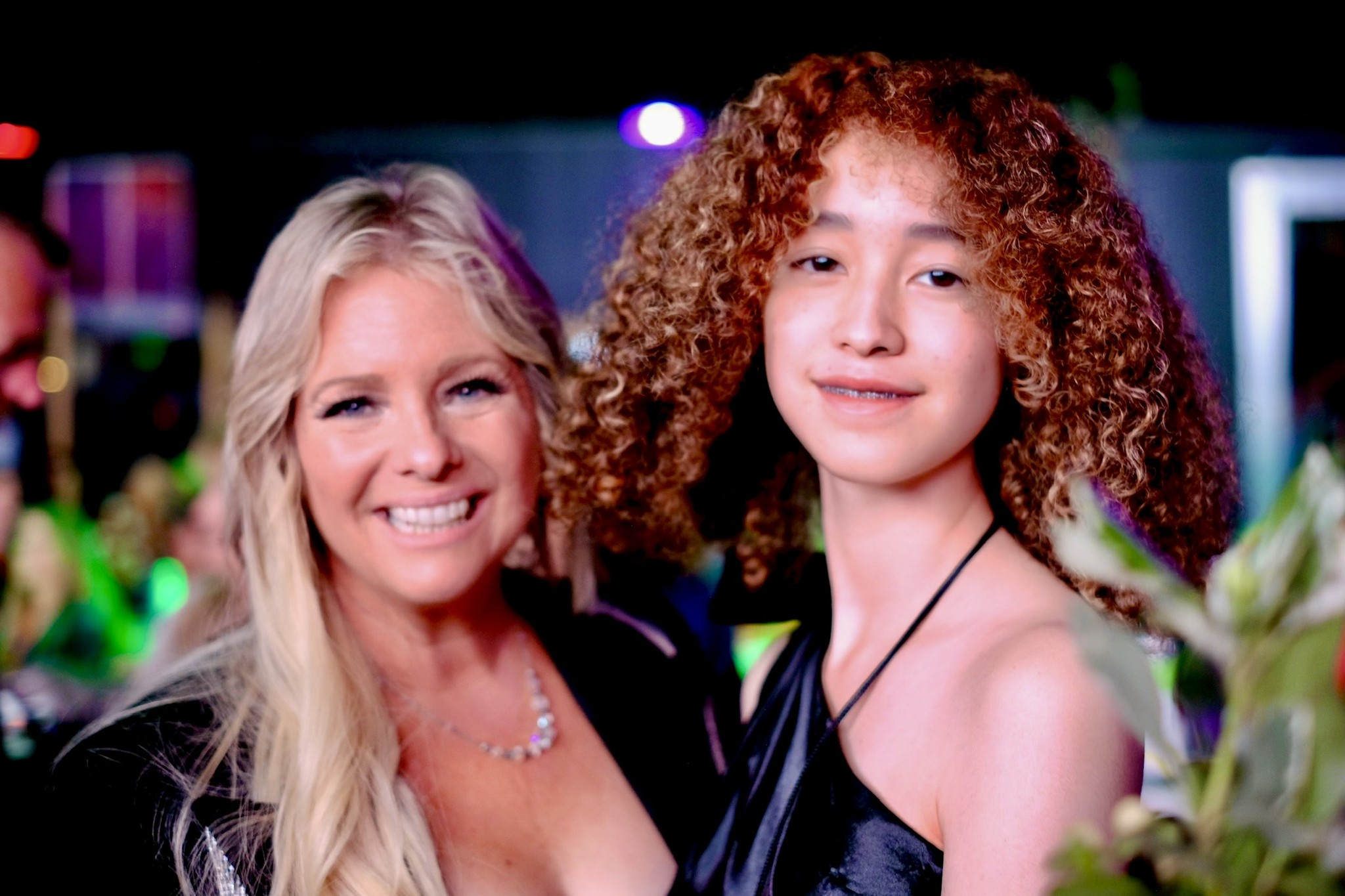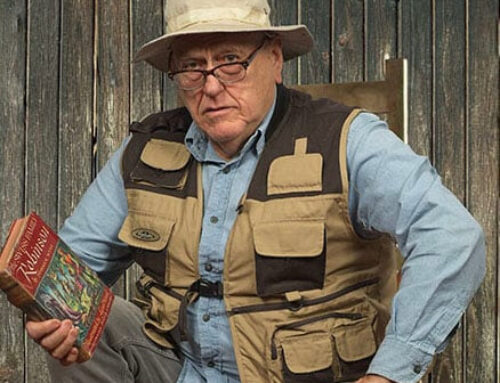Festival showed about 260 films from 30 countries

PJIFF Director Mattie Scariot, left, and Chicago resident Kana Hutchins, who won Best High School Documentary for “Saving Monarchs.” Photo courtesy Poppy Jasper International Film Festival
By Calvin Nuttall
Filmmakers and moviegoers traveled to the South Valley from around the world to enjoy a wide variety of independent films during the 17th Annual Poppy Jasper International Film Festival.
At venues across the South Valley ranging from downtown Morgan Hill, Gilroy and Hollister theaters to a retrofitted barn in San Juan Bautista, the festival ran from April 12 to 19, showcasing thought-provoking documentaries to heartwarming dramas. The PJIFF continues to solidify its reputation as a premier destination for film lovers in the region, allowing filmmakers to mingle with audiences during Q&A sessions, sharing insights about their creative processes and experiences.
Organized by an all-volunteer team led by Director Mattie Scariot, the festival showed about 260 films from 30 countries. Some short films were made only blocks away from the venue where they were screened, and some were brought by filmmakers from as far away as Japan, Iran and England.
To highlight the diversity of the contributing filmmakers, the screenings were organized into daily showcases celebrating a particular theme. These included a showcase for student films, local films, films made by women, films containing LGBTQ+ themes, films from Mexican-American filmmakers, and films from Iran.
“Knowing the deficit in Hollywood for women and minorities, I knew if I was going to do this festival I would have a purpose,” Scariot said. “I wanted to focus on people who are not normally heard from.”
This desire to shine a light on underrepresented groups stems from her own experience as a woman in film, and a desire to create a better future for the next generation, she said.
“Growing up, I always knew I wanted to work on movies,” she said. “But, I could never see myself in the credits, because it was just always men’s names, except for wardrobe and makeup. I don’t want any little girl to ever walk up to a poster and not see themselves in it.”
Among the films shown during the Women Filmmakers’ Showcase April 14 was “Promises,” a short drama directed by Faye Brenner. During a discussion panel preceding the screening, the Southern California filmmaker shared her experience as a young woman entering into the filmmaking industry during the 1970s, a difficult time for women in the profession.
“There were no female directors in television and very few who were doing features,” she said. “I’ve even had lovely directors and producers who liked me say, ‘You’re never gonna make it, you’re never gonna be a director, they’re never gonna give it to you.’ And my attitude is, ‘Oh yeah? Watch this.’ So here I am, I’m 70, this is my first film, and I’m not stopping now!”
Later, on LGBTQ+ Day, filmmakers and panelists Lane Stanley (co-writer/director of “Boifriend,” which won Best LGBTQ+ Short) and Zheng Nie (writer/director of “Strangers”) discussed the state of gay representation in film and television and presented their thoughts on the future of the genre.
“It is moving forward, and we have more queer content at every level,” Stanley said. “I think we’re in a time when we’re dealing with how we can break out of the tropes that we’ve all grown used to in our limited exposure to queer content.”
Nie agreed the LGBTQ+ genre is ready to evolve beyond introductory topics and delve into more involved stories.
“I feel like we are ready for more of a nuanced conversation,” he said. “Coming-out stories are still very important, but we’re ready to ask the question of, ‘Well, what happens next?’ ‘Strangers’ was intended to address that question. I feel like we are ready for that kind of conversation, although it can be very uncomfortable.”
On the day of the Mexican-American Filmmaker Showcase, one of two festival Icon awards was presented to famed Chicana activist and filmmaker Lupe Valdez. Unlike the festival’s other awards, the Icons are not bestowed upon a filmmaker for a particular work but are instead meant to recognize a member of the filmmaking community who has served as an inspiration for others.
“I’m so grateful, I’m humbled by Mattie and the whole Poppy Jasper festival,” Valdez said after the presentation in The Barn at Mission Farm in San Juan Bautista. “I’ve never really been a person to stand in front of an audience. My husband is usually in the spotlight. I’ve been a part of the production crew a lot, so it has been an incredible experience to have this kind of recognition, especially from my community here locally.”
Lupe and her husband, Luis Valdez (writer/director of “La Bamba”), are founding members of the legendary Chicano theater company El Teatro Campesino, which began in 1965 performing plays from the back of a flatbed truck in Central California. Long based in San Juan Bautista, it has since grown into an international theater troupe.
“Poppy Jasper is a film festival and we’re a theater company,” Lupe said. “But now it’s one big family. I think it is so important for artists to have a place to screen their films so that other people can see them. It’s easy to just post it on YouTube, but it doesn’t have that same connection with people. You need that feedback and sense of community. That is what is important about the film festival.”
The second Icon award was granted to Welsh actor and writer Ian Puleston-Davies, who also took home Best Drama Feature for his movie “Bolan’s Shoes.”
“This is an incredibly beautiful, heartfelt festival,” Davies said as he accepted his awards in the Champagne Room of Morgan Hill’s Granada Theater. “It’s not the biggest, and it’s not the smallest, but it is certainly one of the most heartfelt festivals I’ve been to in my film career, and it’s down to this heart here,” he said, indicating Scariot.

“We live in a great community that really does come together to put on a great festival,” she said. “There is no way we could put on a festival this great with the budget we have if the community didn’t help out as much as they do. The venues are really the shining stars of the festival. They all pitched in.”
Running such a big festival with only volunteers is not easy. Scariot hopes to secure more funding for future iterations in order to hire paid staff to help it run more smoothly.
“Our next step is creating jobs within the festival,” she said. “We had a lower number of volunteers this year, which made it tough. My mom (Diane Scariot) worked so hard, I don’t know what I would have done without her.”
Scariot attributes much of Poppy Jasper’s success to the filmmakers themselves, by widening the festival’s audience with their own social networks.
“Every single filmmaker that comes showcases themselves on social media, and our audience expands with their audience,” she said. “We’ve got this momentum through social media that we’ve never had before. We’re not just getting more films, we’re getting better and better films because of our reputation within the industry. We’re getting people’s attention.”
Calvin Nuttall is a Morgan Hill native with a passion for nature, science, and technology.





